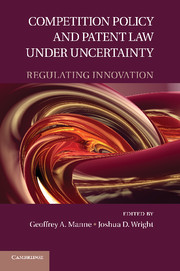Book contents
- Frontmatter
- Contents
- Contributors
- Introduction
- PART I THE INSTITUTIONS OF GROWTH
- PART II THE ECONOMICS OF INNOVATION
- PART III INNOVATION AND COMPETITION POLICY
- PART IV THE PATENT SYSTEM
- PART V PROPERTY RIGHTS AND THE THEORY OF PATENT LAW
- PART VI INTELLECTUAL PROPRETY AND ANTITRUST: THE REGULATION OF STANDARD-SETTING ORGANIZATIONS
- 15 Increments and Incentives
- 16 What's Wrong with Royalties in High-Technology Industries?
- 17 Federalism, Substantive Preemption, and Limits on Antitrust
- Index
- References
17 - Federalism, Substantive Preemption, and Limits on Antitrust
An Application to Patent Holdup
Published online by Cambridge University Press: 05 June 2012
- Frontmatter
- Contents
- Contributors
- Introduction
- PART I THE INSTITUTIONS OF GROWTH
- PART II THE ECONOMICS OF INNOVATION
- PART III INNOVATION AND COMPETITION POLICY
- PART IV THE PATENT SYSTEM
- PART V PROPERTY RIGHTS AND THE THEORY OF PATENT LAW
- PART VI INTELLECTUAL PROPRETY AND ANTITRUST: THE REGULATION OF STANDARD-SETTING ORGANIZATIONS
- 15 Increments and Incentives
- 16 What's Wrong with Royalties in High-Technology Industries?
- 17 Federalism, Substantive Preemption, and Limits on Antitrust
- Index
- References
Summary
Introduction
In Credit Suisse v. Billing, the Court held that the securities law implicitly precludes the application of the antitrust laws to the conduct alleged in that case. The Court considered several factors, including the availability and competence of other laws to regulate unwanted behavior, and the potential that application of the antitrust laws would result in “unusually serious mistakes.” This chapter examines whether similar considerations suggest restraint when applying the antitrust laws to conduct that is normally regulated by state and other federal laws. In particular, we examine the use of the antitrust laws to regulate the problem of patent holdup of members of standard-setting organizations (SSOs). While some have suggested that this conduct illustrates a gap in the current enforcement of the antitrust laws, our analysis finds that such conduct would be better evaluated under the federal patent laws and state contract laws.
The patent holdup problem has become one of the most controversial issues in antitrust policy. The basic economics of patent holdup in the standard-setting context are generally well understood and related to the more general problem of holdup in the presence of relationship-specific investments: After an SSO has adopted a standard, and investments have been made to commit to the new technology, a patent holder may “hold up” users in a variety of ways that result in more favorable licensing terms than those contracted for ex ante.
- Type
- Chapter
- Information
- Competition Policy and Patent Law under UncertaintyRegulating Innovation, pp. 479 - 530Publisher: Cambridge University PressPrint publication year: 2011
References
- 1
- Cited by



